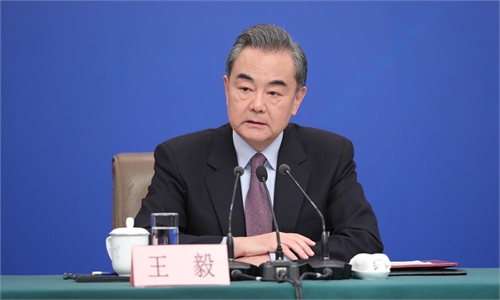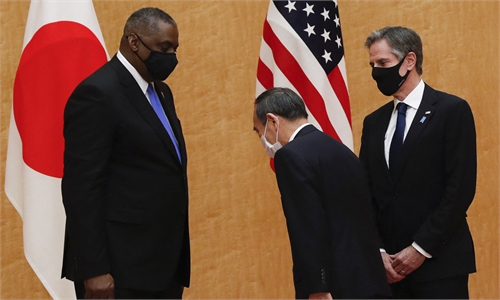COMMENTS / EXPERT ASSESSMENT
Japan should value its beneficial economic ties with China

Illustration: Tang Tengfei/GT
Chinese State Councilor and Foreign Minister Wang Yi has sent a message of great importance to his Japanese counterpart ahead of a US-Japan summit next week: China and Japan should stay out so-called great power rivalry game and value a hard-won economic development of the two Asian nations.
As an independent country, Japan should look at China's development in an objective and rational way, instead of being misled by some countries holding biased view against China, Wang noted during a phone call with Japanese Foreign Minister Toshimitsu Motegi on Monday, pointing out the right direction for bilateral relationship.
With bilateral relations with China at a new crossroad, Japan should realize that a largely improved bilateral relationship does not come easy, and it shouldn't let the US' political maneuver ruin the precious outcome.
Through years of joint effort, China and Japan have built a deeply intertwined and highly complementary industrial chain, which also constitutes an indispensable link within the industrial chain of the Asia-Pacific region. And the deepening economic cooperation between the second and third largest economies in the world has become an essential piece of regional economic architecture.
Japan has bolstered its commitment to regional economic integration. The ink of the Regional Comprehensive Economic Partnership (RCEP) in last November was widely deemed as an important indication of Japan's attitude shifting toward regional cooperation. And it has signaled intention to accelerate the negotiation of a higher level trilateral free trade agreement (FTA) together with China and South Korea.
Against this backdrop, the two Asian neighbors have great common grounds in economic development. Both sides hope to maintain stability in Asia-Pacific region and realize a faster economic recovery from COVID-19 pandemic impacts, especially for Japan whose economy comeback from its worst postwar recession earlier in 2020 still faces stalled risks.
It has proved that China's economic development also means important opportunity for Japan's long-term economic development. For the sake of Japan's own economic interests, the Suga administration is expected to keep up with current development trend and further promote economic cooperation with China.
However, as the Biden administration has ramped up efforts to bring together allies to counter China, Tokyo has shown some dangerous moves tilting toward the wrong direction of interfering China's internal affairs, such as Hong Kong and Xinjiang. During the phone call with his Japanese counterpart, Chinese Foreign Minister refuted Japan's recent baseless accusation.
It's plain to all observers that Tokyo is trying to catering to the Washington's strategic deployment to counter China. But the determination of the Chinese people to safeguard their core national interests can never be doubted. It's crucial for Tokyo to ensure the message sent by China is well received and stop tilting to the wrong direction before irreparable damage has been made to bilateral economic cooperation.
The author is director-general of the Institute of Japanese Studies at the Chinese Academy of Social Sciences. bizopinion@globaltimes.com.cn



